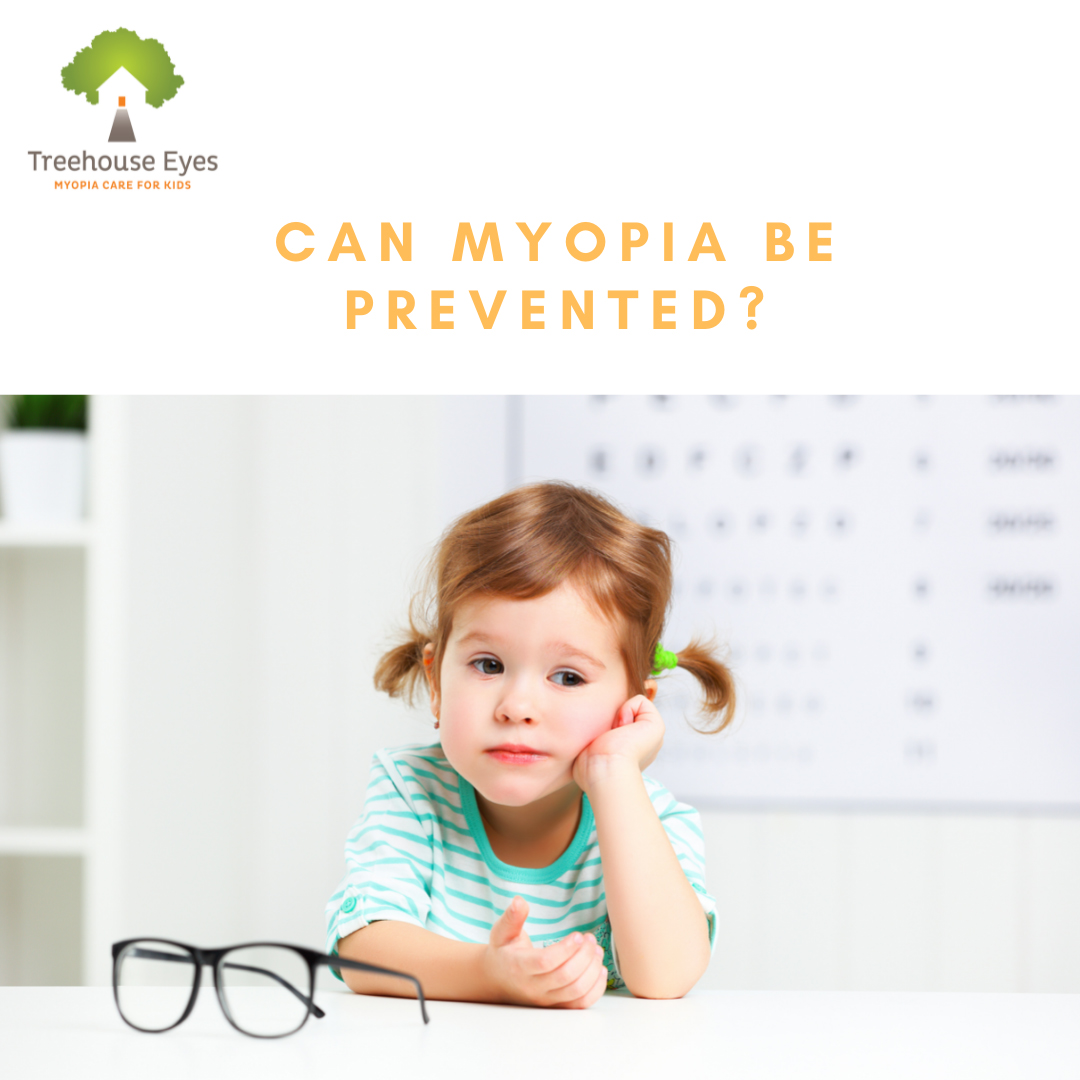
Parents who are nearsighted often wonder what can be done to prevent their children from developing the same or similar conditions.
While scientists haven’t yet found a way to guarantee that your child won’t develop myopia (often referred to as nearsightedness), there are things you can do to delay its onset and even prevent its progression.
WHAT IS MYOPIA?
Myopia is a progressive eye disease that causes the eye to grow longer than normal, altering its ability to correctly focus light onto the retina.
This results in blurred distance vision that can make it difficult for children to learn efficiently in the classroom or take part in extracurricular activities.
We measure it using special non-invasive technology to calculate the length of the eye from the front (cornea) to the back (retina). This distance is known as the axial length and is measured down to fractions of a millimeter with advanMyopia is often corrected with prescription glasses or contact lenses, but these methods simply correct the child’s vision while allowing the condition to worsen.
WHY IS IT IMPORTANT TO DELAY OR SLOW MYOPIA PROGRESSION?
The worse your child’s myopia gets, the higher their chance of developing sight-threatening diseases like glaucoma, macular degeneration and retinal detachment later in life.
That’s why it’s important to try and keep your child’s lens prescription low and controlled using the methods listed below. If your child doesn’t yet have myopia, following the same protocol will help prevent myopia onset for as long as possible.
IS IT POSSIBLE TO PREVENT MYOPIA OR MYOPIA PROGRESSION?
While many children inherit myopia from their parents, there are also several environmental factors that can lead to the onset and progression of nearsightedness. By making some lifestyle changes, it may be possible to delay the onset of myopia and prevent its progression.
BOOST DAILY OUTDOOR TIME
Research shows that children of myopic parents who spend a lot of time outdoors have lower rates of myopia than children who stay mostly indoors.
A recent study published in Review of Optometry (2021) concluded that children should spend at least 2-3 hours per day engaged in outdoor activities to delay the onset of myopia, especially if a child has one myopic parent.
Another study published in Ophthalmic Research (2020) confirms the protective effect of “sun time” against myopia onset. When observing the myopia rates of 6-12-year-olds, there were fewer new myopia cases in the group of children who spent between 11-15 hours outdoors per week, compared with children who didn’t. The researchers also found that the myopia progression rate was slower in the group of children who spent more time in the daylight.
If you do add some extra outdoor time to your child’s daily routine, be sure to provide them with UV blocking sunglasses, sunscreen, a water bottle and other sun-safe gear.
LIMIT SCREEN TIME
Screen time is thought to have a greater impact on a child’s vision than other near work like reading a book, for a few reasons.
Children are exposed to digital screens at a younger age than other forms of near work, and they tend to use screens for longer intervals of time. Additionally, the working distance between a child’s eyes and a digital screen tends to be shorter than the distance between their eyes and a book or other object, to compensate for the small print size and images.
An article published in Review of Myopia Management (2021) examines the results of several scientific studies that analyze the relationship between screen time and myopia. Two of these studies found that the risk of developing myopia was 8 times greater for children aged 5-15 who used a smartphone or video game for more than 2 hours a day, compared to children who have 0-2 hours of daily screen time.
And while we don’t expect parents to ban all digital devices from their homes, it is advisable to set daily limits on digital device usage.
Try to cap your child’s daily screen time at 2 hours. Children under the age of 2 should have as little screen time as possible.
ENCOURAGE FREQUENT BREAKS FROM NEAR WORK
Any sort of near work, like reading and writing, puts a strain on your child’s eyes and can contribute to myopia onset and progression.
One way to prevent myopia development in your child is to teach them to take breaks from visually demanding activities.
A 2008 study published in the journal of Investigative Ophthalmology and Visual Science found that the intensity of near work plays an important role in myopia development in schoolchildren. According to the study, the duration of uninterrupted near work seems to be more significant than the overall time spent engaged in close-distance activities.
REGULAR MYOPIA EYE EXAMS
Whether or not your young child or teen has myopia, yearly eye exams with your optometrist are crucial to keeping their vision healthy and clear.
It’s important to note that vision screenings in school are not enough to detect most visual problems, and certainly not for preventing myopia.
Tracking your child’s eyesight yearly will help determine the best treatment for preventing myopia onset and slowing or halting its progression.
TREEHOUSE EYES CAN HELP PREVENT MYOPIA PROGRESSION
The good news is we help prevent or slow down myopia progression in kids—just like yours—so they can have their best shot at academic and social success!
The Treehouse Eyes eye doctors use state-of-the-art equipment to develop a personalized treatment plan for your child. Our non-invasive treatments include customized contact lenses and special prescription eye drops. Moreover, data shows that our patent-pending Treehouse Vision System® treatment plan can decrease myopia progression by 78%.
Give your child the tools they need to succeed! To schedule your child’s back-to-school eye exam, schedule now or to see a list of all providers near you visit Treehouse Eyes today.



 Dr. Kapadia originally hails from St. Catharines, Ontario, Canada where he earned his Bachelor of Arts degree from Brock University. He then went on to graduate with honors from the Michigan College of Optometry in 1998, where he specialized in contact lenses. After he graduated, Dr. Kapadia completed a one-year residency at the renowned Bascom Palmer Eye Institute in Miami, Florida, where he focused on ocular diseases.
Dr. Kapadia originally hails from St. Catharines, Ontario, Canada where he earned his Bachelor of Arts degree from Brock University. He then went on to graduate with honors from the Michigan College of Optometry in 1998, where he specialized in contact lenses. After he graduated, Dr. Kapadia completed a one-year residency at the renowned Bascom Palmer Eye Institute in Miami, Florida, where he focused on ocular diseases. Dr. Kapadia graduated with honors from the Michigan College of Optometry in 1999, where she received the Wesley-Jessen award for Outstanding Work in Contact Lenses. During her studies, she also served as President of Student Volunteer Optometric Services to Humanity (SVOSH), which works to improve the sight of millions of people in developing countries.
Dr. Kapadia graduated with honors from the Michigan College of Optometry in 1999, where she received the Wesley-Jessen award for Outstanding Work in Contact Lenses. During her studies, she also served as President of Student Volunteer Optometric Services to Humanity (SVOSH), which works to improve the sight of millions of people in developing countries. After growing up in Minersville, Pennsylvania, Dr. Price graduated from Susquehanna University in 2012 with a Bachelor’s Degree in Biology. Dr. Price continued her education at the Pennsylvania College of Optometry and completed her training in 2016. After graduation, Dr. Price spent her career studying advanced eye diseases and specialized Low Vision services and devices.
After growing up in Minersville, Pennsylvania, Dr. Price graduated from Susquehanna University in 2012 with a Bachelor’s Degree in Biology. Dr. Price continued her education at the Pennsylvania College of Optometry and completed her training in 2016. After graduation, Dr. Price spent her career studying advanced eye diseases and specialized Low Vision services and devices. Dr. Morgan Kickliter grew up in Hendersonville, Tennessee.
Dr. Morgan Kickliter grew up in Hendersonville, Tennessee. Dr. Phillips earned his Bachelor of Science in Chemistry at the University of Georgia before achieving his Doctor of Optometry from the Southern College of Optometry. There, he served as Vice President of the Georgia Optometric Student Association and provided free and cost-reduced optometric care to underserved patients in Mexico and Belize with the Student Volunteer Optometric Services to Humanity. He served his residency at Gainesville Eye Associates, focusing on ocular diseases.
Dr. Phillips earned his Bachelor of Science in Chemistry at the University of Georgia before achieving his Doctor of Optometry from the Southern College of Optometry. There, he served as Vice President of the Georgia Optometric Student Association and provided free and cost-reduced optometric care to underserved patients in Mexico and Belize with the Student Volunteer Optometric Services to Humanity. He served his residency at Gainesville Eye Associates, focusing on ocular diseases.